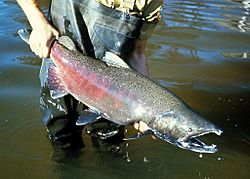Salmonidae facts for kids
Quick facts for kids SalmonidaeTemporal range: Upper Cretaceous to Recent
|
|
|---|---|
 |
|
| Chinook salmon Oncorhynchus tschawytscha |
|
| Scientific classification | |
| Kingdom: | |
| Class: | |
| Infraclass: | |
| Order: |
Salmoniformes
|
| Family: |
Salmonidae
G. Cuvier, 1816
|
The Salmonidae are a group of fish that belong to a special family. They are the only living family in the larger group called Salmoniformes. This family includes many well-known fish like salmon, trout, chars, graylings, and freshwater whitefish.
The famous Atlantic salmon and trout, which belong to the group Salmo, gave this family and order their names.
What Are Salmonidae?
Salmonidae are a family of fish known as ray-finned fish. This means their fins are supported by bony spines or "rays." They are the only family that exists today in the order called Salmoniformes.
What Salmonidae Look Like
Salmonids might seem a bit old-fashioned compared to some other fish. Their pelvic fins are located far back on their bodies. They also have a small, fleshy fin called an adipose fin near their tail.
These fish are usually slender and have rounded scales. Their tails are forked, which helps them swim fast. Inside their mouths, they have a single row of sharp teeth. While some small species are only about 13 cm (5.1 in) long, most are much bigger. The largest ones can grow up to 2 m (6.6 ft)!
The Life Cycle of Salmonidae
All salmonids start their lives and lay their eggs in fresh water. This is called spawning. Many of these fish spend most of their adult lives in the ocean. Then, they travel back to the rivers where they were born just to reproduce. This journey is a type of migratory life cycle.
Salmonids are predators. This means they hunt and eat other smaller creatures. Their diet includes small crustaceans, insects that live in the water, and even smaller fish.
See also
 In Spanish: Salmónidos para niños
In Spanish: Salmónidos para niños
 | William M. Jackson |
 | Juan E. Gilbert |
 | Neil deGrasse Tyson |

